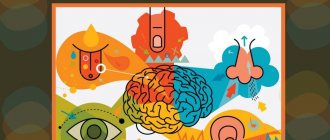The most curious question of where a person’s dreams come from comes to mind even in childhood. Almost every person regularly sees dreams, these are some fleeting images or entire plots, like in a movie. Most often we see dreams from the first person, less often from the third. In the morning, the dream or most of it is forgotten, but sometimes we remember them, because during the day we remember those realistic experiences and vivid images.
Scientists are also interested in the mechanism of dreams. A lot of research has been done on this topic and many papers have been written. But science cannot accurately answer the question of what causes dreams. There are several theories that are considered the most plausible, they are presented in this article. We will also look at other important topics: who and when tends to have vivid dreams, why do people suffer from nightmares, what other dreams are there?
To understand dreams, you need to understand what sleep is and why people need it so much. This is a natural state that is divided into several cycles. The brain continues to work, but its activity decreases, and the reaction to external stimuli is dulled. For a long time, everything related to sleep remained a mystery. Now science has learned a lot, but not everything we would like.
Many are of the opinion that we need sleep to relax. But this was refuted in the last century. Studies have shown that during sleep, brain activity decreases by only 10-15% relative to light sleep. As for the muscular system, to rest it you just need to be at rest.
Therefore, at the moment, sleep is no longer considered as rest, but as a mechanism of self-regulation. This is a relief for the psyche, an opportunity to systematize memories for the brain, a reduction in stress for the body as a whole, a period of active removal of toxins and renewal of body cells.
If you don't get enough sleep regularly, the body's defenses are weakened, problems with metabolic processes are created, and the risk of cardiovascular diseases increases. And if we don’t sleep for two days or longer, then we will encounter clouding of consciousness and even hallucinations, auditory and visual, an exacerbation of paranoid traits, and a lack of coherent thinking and speech. Without sleep, the body wears out greatly; if a person does not sleep for ten days, he will lose his mind or die.
What is sleep
The word "sleep" comes from the Latin somnus. It denotes the physiological state of a living organism in which reactions to the outside world or external stimuli are reduced. In simple terms, sleep is rest, restoration of strength and energy. Several centuries ago it was believed that during sleep the soul leaves the body and travels around the world. It was just not known which one. What the soul saw on its way was called a dream.
With the development of technology, it became clear that no soul goes anywhere during sleep. However, scientists have not figured out for certain what sleep is. And this despite the fact that somnology (the science of sleep) is developing quite quickly.
It was possible to establish only 3 indisputable facts:
- During sleep, a person is relaxed, almost completely motionless.
- The sleeper's consciousness turns off. But not completely, since many people react to smells. In addition, almost everyone hears the alarm ringing.
- During sleep, the brain continues to work. A number of processes occur in it that are not present during wakefulness, coma, or fainting. This is one of the reasons why dreams occur.
Scientists have also divided sleep into cycles and phases.
What is a prophetic dream that is so often talked about? This is a dream that is completely or partially repeated in life. According to scientists, it is associated with increased sensitivity of the brain. Usually closer to the morning he begins to work more intensely. Because of this, it detects the slightest changes, even those that a person does not feel while awake. These changes may not wake you up. However, the subconscious will definitely see them. This is one of the theories for the appearance of prophetic dreams.
Why does a person sleep
First, let's figure out why we need sleep at all.
Sleep is a natural state of the body that includes several cycles. During this period, brain activity is reduced, as is the reaction to external stimuli.
For a long time, the mechanism of the sleep state and the reason for dreaming were under a veil of secrecy, and scientists from different times made assumptions based on their conjectures. Modern technologies have made it possible to study the human brain during sleep, and people have received answers, although only to some questions.
Why does a person need sleep?
There are 5 reasons:
- To rest and restore the strength spent during the day. Without rest, the body and brain will quickly wear out.
- Analyze and sort out the information received. The brain will retain what is needed and remove what is unnecessary.
- To “kill” time at night. Imagine our ancestors. If they did not sleep, but wandered outside their homes out of boredom, they could become prey to large predators.
- To restore the body's defenses.
- To remove harmful waste products from the brain.
“Usually people see in their dreams what they think about during the day.” - Herodotus.
The answer to the question of why you need to sleep is provided by interesting experiments. The first was unplanned, but rather accidental. A medical journal published in 1859 spoke about him. A Chinese man killed his wife. A French court sentenced him to death by sleep deprivation. The killer was watched by 3 guards. Their job was to keep him awake. After 10 days, the prisoner was ready for any other execution, as he experienced inhuman suffering.
In our time, such studies were carried out purposefully. The subjects deliberately did not allow themselves to fall asleep. After 5 days they encountered the following problems:
- hearing and vision have deteriorated;
- coordination of movements is impaired;
- it became difficult to concentrate;
- Several people experienced hallucinations.
Also, people without sleep lost weight. And this despite a balanced diet. The listed experiments once again prove the importance of sleep for the human body.
Dreams and creativity
The psychology of sleep and dreams is manifested in observations. research. Usually dreams are associated with art - they are used in poetry, music, and songs. At the same time, scientists have repeatedly noticed that flashes and insights come in a state of sleep.
Thus, Friedrich Kekule received the answer to the structure of benzene in a dream, having previously thought about this issue for a long time. D. Slower saw the finally constructed table of signs also in a dream. Otto Levi, while studying the transmission of nerve impulses by chemical means, saw an experiment in a state of sleep that confirmed the theory. Elbert Einstein also reported: the theory of probability is the result of dreams.
What is the secret, what forces helped the scientists? Perhaps the unconscious level was able to provide clues that could not be found in the conscious state. Such discoveries also happen in creativity - a person can wake up and write lines of a work, a plot for a novel, an idea for a speech, or a film.
Psychologists conducted experiments with a group of people with unfinished creative projects. As a result, it was determined that the best results in such work are provided by “fantasizing in real life” and “hypnotic dreams” - a person is set up for a prophetic dream, which he should see at night.
It is also known that William Styron wrote the novel “Sophia Makes a Choice” based on a dream, and Ingmar Bergman created films based on dreams. Thus, the skillful use of dreams can help in creating masterpieces of art and solving scientific issues; dreams provide hints, keys to solving problems, the main thing is to see and understand these signals from our unconscious part of thinking, the hidden “I”.
Perhaps that is why in folk tales there is a catchphrase - “the morning is wiser than the evening,” because at night you can get answers to all the riddles by listening to the symbols of sleep. Sometimes musicians and other creators deliberately go into a state of dormancy to activate their creative powers. This is what Robert Stevenson and Salvador Dali did.
What parts does a dream consist of?
One sleep cycle lasts up to 2 hours. It consists of a slow and a fast phase or stage.
Fast phase
Otherwise called fast wave or paradoxical. At this time, work is carried out with the subconscious. The brain of a sleeping person processes the information received during the day. This is why we dream. This helps you get used to changing circumstances.
“Dreaming is the royal road to the unconscious.” - Sigmund Freud.
With each sleep cycle, the paradoxical phase lasts longer. It can be determined by the following characteristics:
- decreased muscle tone;
- rapid movements of the eyeballs under the eyelids;
- arrhythmia (breathing, pulse).
Interestingly, it is at this stage that a person sees the most impressive dreams.
NREM sleep
Otherwise called orthodox. During it, the processes occurring in the body are normalized, strength and energy are restored.
Conventionally, this stage is divided into 4 parts:
- Nap. Transitional phase between wakefulness and sleep. A person perceives reality poorly and sees the first dreams.
- Superficial. Consciousness turns off. But at the same time, hearing is activated. A sleeping person can easily be awakened by loud noises.
- The third stage is characterized by an increase in the depth of dreams.
- Delta sleep. Decreased sensory activity. During this phase, it is very difficult to wake a person.
The Orthodox stage lasts about an hour and a half. Afterwards, paradoxical or REM sleep begins again.
Cyclicality
One sleep cycle looks something like this:
- A person goes to bed, turns off the light, muffles the sounds. Nap begins - the first part of the slow phase.
- Stages 2 and 3 begin.
- If no one disturbs the peace during stages 2, 3, the brain will plunge into delta sleep.
- The Orthodox stage goes in the opposite direction to stage 1.
- REM sleep sets in.
And so on in a circle. The average frequency is 4-6 times per night.
How does the brain understand that it is time to wake up?
All living beings on Earth have adapted to the rotation of our planet, to the change of night and night, and to the need to alternate periods of activity with rest and peace. Scientists have known for many years that living organisms, including humans, have internal biological clocks that help recognize natural rhythms and adapt to the night and night shifts. But how do these clocks actually work? The answer to this question provides insight into how the brain recognizes that it is time to wake up.
Back in 1729, French astronomer and chronobiologist Jean-Jacques de Meran discovered circadian rhythms while observing the mimosa plant. He discovered that the plant's leaves open during the day and close towards the end of the day. When Jean-Jacques placed a mimosa in a dark basement without light, he was surprised to find that it continued to open and close its leaves in the rhythm of day and night. This was the very first suggestion that these rhythms have the same explanation as why humans alternate between sleep and wakefulness [The Nobel Prize, 2017].
In 2022, Nobel laureates Geoffrey Hall, Michael Rosbash and Michael Young were able to peer deep into our biological clock. Their discoveries explain how plants, animals and people adapt their biological rhythm so that it synchronizes with the rotation of the Earth [The Nobel Prize, 2017].
Experiments were carried out by scientists on Drosophila flies, in which they isolated a gene that controls normal daily biological ri, and they are associated with the change of day and night. It has been proven that circadian rhythms have the same principles of operation in all multicellular organisms, including humans.
Circadian rhythms adapt all physiological processes in the body to the phases of the day (days). They also regulate metabolism, hormone levels, behavior and, of course, sleep.
It turned out that there is a period gene that controls the normal biological rhythm of living beings, and the principle of its operation looks very unusual: the system itself controls its activity through a “feedback loop.” The period gene is responsible for the accumulation of a special PER protein in the cell at night, and then, when its concentration reaches the required level, the body understands that it is time to wake up.
During wakefulness, the protein begins to break down, and then the cycle repeats again. This whole process takes 24 hours - that’s how the daily cycle turns out. At night the protein accumulates and during the day it is destroyed, and thus a self-regulating clockwork mechanism operates.
Of course, sleep research continues, but it is this data that serves as the basis for explaining many of the effects and phenomena of human sleep. For example, the scientific community refutes hypotheses about the effectiveness of polyphasic sleep (when a person sleeps little by little in fits and starts during the day).
The reason is that alternating REM and NREM sleep promotes proper rest. A person recovers at the physical and mental levels thanks to the phases of sleep. The data received during the day is assimilated, and unnecessary information is erased. Perhaps you yourself have noticed that when you urgently need to remember something (a phone number, if there is nowhere to write it down, answers to tickets the night before an exam), it is forgotten with lightning speed. This occurs when those phases of sleep that are responsible for the transition of information into long-term memory were missed. Sleeping in fits and starts and lack of sleep negatively affects the ability to remember what you need and forget what you don’t need.
Experts say that if there are conditions in a person’s life under which circadian rhythms are not observed (for example, daily work, night shifts), gradually the discrepancy between lifestyle and natural processes affects our well-being. And this, in turn, increases the risk of diseases [RBC, 2017].
Poor quality or irregular sleep often causes irreparable harm to people. Here are a few facts that confirm this:
| ✔ | There are many known cases, the causes of which are attributed to the human factor, when emergency situations and accidents in production, in uninterrupted workshops occurred precisely in the pre-dawn hours. The deepest and most sound sleep occurs precisely in the period from 3 to 5 am [RBC, 2017]. |
| ✔ | Lost daylight hours. Unnaturally long daylight hours (for example, daily work) leads to problems with excess weight and diabetes. A person needs energy to work, he eats at night, gets more calories than he needs, and in addition there is a load on the internal organs, which are simply not suitable for night digestion. Short daylight hours cause depression because the body needs daylight for normal cellular metabolism. You can sleep 45 minutes a day, an average of six hours, but this regime reduces the prospect of remaining healthy after 65 years and without medical care to zero [Independent, 2017]. |
| ✔ | A car driver is 4.3 times more likely to have an accident if he slept less than five hours a night, and if he slept less than four hours - 11.5 times [Smartdriving, 2019]. |
| ✔ | The risk of developing cancer (breast, prostate, colon) increases proportionally with lack of sleep. A corresponding study was conducted on night shift workers [Current Biology, 2015]. |
| ✔ | The functions of the reproductive system suffer: sex hormones are produced 10-15% less in those who sleep five hours or less [A. Yu. Bespyatykh, V. A. Brodsky et al., 2009]. |
| ✔ | Strength and quality indicators in athletes suffer from lack of sleep, exhaustion occurs faster by 10-30% [A. Yu. Bespyatykh, V. A. Brodsky et al., 2009]. |
Normal sleep affects health and quality of life in general, this is undeniable. We can do everything to preserve and support it. This is why it is so important to sleep the recommended amount of time.
However, there is a polyphasic sleep mode (which we briefly mentioned above) - this is a mode in which a person, by reducing sleep duration, frees up more time for work, relationships, hobbies, self-development, etc. Currently, this regime has many supporters, because modern people want to be able to do everything they have planned during the day, and not waste it on sleep. But in this lesson we present norms that correspond to the “classical” sleep pattern and are typical of the day of most people.
How much sleep do you need at each age?
According to studies, the need for sleep decreases with age. If newborns sleep 2/3 of the day, then older people need 7-8 hours. The generally accepted norms look like this:
| Age | Hours of sleep |
| 0-3 months | 14-17 |
| 4-11 months | 12-15 |
| 1-2 years | 11-14 |
| Preschoolers (3-5 years old) | 10-13 |
| Schoolchildren (6-13 years old) | 9-11 |
| Teenagers (14-18 years old) | 8-10 |
| Youth (18-25 years old) | 7-9 |
| Adults (26-64) | 7-9 |
| Elderly people (from 65 years old) | 7-8 |
These are conditional or average indicators. Get as much sleep as you need to make the most of your remaining time.
What are the risks of sleep disorders?
Surely you have noticed that after poor or too short sleep, your health leaves much to be desired. Attention becomes distracted, the accuracy of reactions deteriorates, and mood is at zero. Everything falls out of hand, you can’t cope even with simple tasks, and all this is often accompanied by irritation.
This happens because the body has not had time to restore the strength expended over the last 24 hours and process the information received. The reboot did not happen and you are “working” on the remaining resources of the previous day.
What happens to a person who doesn’t sleep enough for a long time:
- metabolism is disrupted;
- the body is exhausted because it does not have time to recover;
- immunity decreases, as a result of which a person often gets sick;
- the risk of cardiovascular disease increases;
- the likelihood of developing type 2 diabetes also increases;
- Cognitive functions (memory, thinking, attention), speech, control function decrease;
- total body weight increases (during the deep sleep phase, excess fat is broken down);
- deterioration in productivity and decline in motivation;
- lack of sleep often leads to depression (what is it?).
If you do not sleep for two days in a row, clouding of consciousness will occur, accompanied by hallucinations. A week without sleep threatens paranoia (what is this?), incoherent speech, hallucinations and severe exhaustion of the body. After ten sleepless days, a person goes crazy and dies.
All this is scientific, proven data, so you shouldn’t joke and experiment with your body. You need to go to bed and get up at the same time , sleep at least 8 hours a day. Sleep is a vital process.
A person who sleeps the required amount of time on average lives twice as long as those who ignore the rules of sleep.
How to fall asleep quickly and sleep soundly
Why a person needs sleep is understandable. But sometimes it happens that you can’t sleep. This is due to stress, nervous strain, working night shifts, drinking tonic drinks, eating fatty, heavy foods, changing time zones, changes associated with hormonal levels or age. What to do in such cases?
You need to get ready for bed. You can do this in several ways:
- To start, stop using gadgets about an hour before you go to bed. You can even set a reminder on your mobile phone to put it away at a designated time.
- Eat something light before bed so you don't feel hungry. This could be a small banana, yogurt and other fermented milk products, whole grain crackers. It is not recommended to eat fatty and spicy foods.
- In the evening, prepare everything you will need in the morning. Lay out your clothes and put your lunch in containers.
- Take a warm shower. It will help you relax. Dim the lights, remove loud sounds. In this way, help your brain tune in to rest.
- It is difficult to sleep in a stuffy room. Open the window. Let the room be cool, otherwise you will never be able to sleep soundly, you will toss and turn all night.
- Make your vacation as comfortable as possible. Think about what irritates you. Maybe it's the loud ticking of a clock or the noise of cars outside the window. Find ways to get rid of these irritants.
- Avoid drinking strong coffee and tea before bed. They do not calm, but rather invigorate. The same goes for some fruits and berries: apricots, grapes, rowan, pomegranates. If you are thirsty, drink some water or a cup of warm herbal tea, such as mint.
- Try to free your brain from bad thoughts. To do this, read an interesting book. Don’t think about bad things, don’t try to solve work issues overnight, don’t think about grievances and other negative aspects.
- Make sure you have a comfortable bed and bedding. Buy a good pillow and, most importantly, a mattress. They will help the body relax faster.
There are 2 more tips, following which will help you tune into a positive mood, calm down and sleep soundly:
- Take a relaxing bath. Add foam, salt or aromatic oils to it. Lavender, sage, marjoram and geranium have a hypnotic effect.
- Take a few minutes to do yoga. Or just sit comfortably in a chair, concentrate on breathing, think about the good.
If you can't sleep, consult a doctor for help. Often long-term insomnia is a symptom of serious illnesses.
Interesting facts about sleep and dreams
There are many myths and legends associated with sleep. But there are also scientifically proven facts. Here are some of them.
“Dreams are a grand series of the subconscious.” — Wanda Blonska.
Dreams come to everyone at night
Almost everyone on the planet sees dreams. But we forget 90% of what we saw within 30 minutes after waking up. Scientists have now developed special techniques for lucid dreaming. They allow you not only to remember a dream, but also to manage it.
Great discoveries often come during dreams.
And there are many such examples. For example, the well-known Dmitry Mendeleev saw a table of chemical elements in a dream. And Paul McCartney came to his masterpiece song Yesterday in a dream. Another example is Niels Bohr, who saw the structure of an atom in a dream.
Lack of sleep
Edison, Da Vinci, Tesla, Churchill - these people slept only 3-4 hours a day. And they felt great. Although scientists believe that this is a violation. In their opinion, lack of sleep is the other side of talent or genius.
There is a unique case where a person lived without sleep for 40 years. Austro-Hungarian army soldier Paul Kern was wounded in the head, resulting in severe damage to the frontal lobe of the brain. The man stopped feeling pain and sleeping. Not a single doctor was able to find the cause of this condition and at least somehow change the situation. As a result, Paul Kern died without sleeping once in 4 decades.
Why do you have dreams?
In ancient times, dreams were perceived as encrypted messages from the other world, containing information regarding a person’s future. “Knowledgeable” people (priests, sorcerers, etc.) helped decipher these messages. Over time, dream books appeared, which are still popular today.
However, with the development of psychology and physiology, new views on this phenomenon began to appear, reflected in several theories.
Theory 1: Dreams are images of human desires
The famous psychotherapist Sigmund Freud suggested that in dreams a person sees repressed desires and hidden aspirations . The subconscious seems to communicate with us through dreams. Sometimes this is an exact image, and sometimes it is veiled in some symbols (images).
Freud believed that discussing dreams with a psychotherapist can help resolve a person's internal psychological problems. He even wrote a book, The Interpretation of Dreams, where he talks about typical symbols in dreams that can have similar meanings for different people.
According to Freud, dreams have hidden meanings
Theory 2: Features of the brain
But the eminent psychiatrist John Hobson, on the contrary, said that dreams do not carry any meaning. He studied exactly how dreams arise from a physiological point of view. It turned out that random signals from the brain stem lead to a vision of a plausible reality.
The brain tries to somehow interpret random impulses and puts them into certain plots . He often takes memories as a basis.
Interesting fact! It has been experimentally proven that mammals such as cats and dogs also experience dreams.
Theory 3: Constant activation
Psychiatrist Zhang Jie agrees that nerve impulses lead to dreams. But in her opinion, they are not accidental.
During sleep, the brain systematizes memories, and at the moment they move from short-term memory to long-term memory, they can be partially activated, and we see dreams .
Dreaming may be a consequence of the brain working at night
Theory 4: Threat Modeling
This is a rather unusual explanation for why we dream. It is believed that this ability was inherited by man from ancient ancestors, who, with the help of dreams, could imitate potentially dangerous situations.
In fact, dreams are a protective biological mechanism that allows you to “train” to survive threats . Modern man does not have such a dangerous life as his ancestors, so it is believed that the functions of dreams have changed a little. Hence the next theory.
There was a period when it was believed that sleep was a painful condition arising from accumulated poisons in the human body.
Theory 5: Natural selection of thoughts
Psychologist Mark Blancher suggests that the situations the brain simulates during sleep allow it to choose the best emotional responses . He remembers them and uses them in real life.
That is, in this case, we also train, but taking into account what most often happens in our modern life.
Interestingly, a special type of sleep is lucid dreaming , when a person understands that he is dreaming and sometimes even controls the dream. Some researchers are convinced that anyone can master this with proper training.
Be sure to watch the video with interesting information about dreams :











